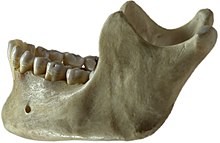анлас
Hello, you have come here looking for the meaning of the word анлас. In DICTIOUS you will not only get to know all the dictionary meanings for the word анлас, but we will also tell you about its etymology, its characteristics and you will know how to say анлас in singular and plural. Everything you need to know about the word анлас you have here. The definition of the word анлас will help you to be more precise and correct when speaking or writing your texts. Knowing the definition ofанлас, as well as those of other words, enriches your vocabulary and provides you with more and better linguistic resources.

анлас
Komi-Permyak
Etymology
Proto-Permic *aŋl- (“jaw”) + -ас (-as)

Pronunciation
Noun
анла́с • (anlás)
Alternative form of ан (an)
Declension
| Declension of анлас (stem: анлас-) | |||
|---|---|---|---|
| singular | plural | ||
| nominative | анлас (anlas) | анлассэз (anlassez) | |
| accusative | I* | анлас (anlas) | анлассэз (anlassez) |
| II* | анласӧс (anlasös) | анлассэзӧс (anlassezös) | |
| instrumental | анласӧн (anlasön) | анлассэзӧн (anlassezön) | |
| comitative | анласкӧт (anlasköt) | анлассэзкӧт (anlassezköt) | |
| caritive | анластӧг (anlastög) | анлассэзтӧг (anlasseztög) | |
| consecutive | анласла (anlasla) | анлассэзла (anlassezla) | |
| genitive | анласлӧн (anlaslön) | анлассэзлӧн (anlassezlön) | |
| ablative | анласлісь (anlasliś) | анлассэзлісь (anlassezliś) | |
| dative | анласлӧ (anlaslö) | анлассэзлӧ (anlassezlö) | |
| inessive | анласын (anlasyn) | анлассэзын (anlassezyn) | |
| elative | анласісь (anlasiś) | анлассэзісь (anlasseziś) | |
| illative | анласӧ (anlasö) | анлассэзӧ (anlassezö) | |
| egressive | анлассянь (anlasśań) | анлассэзсянь (anlassezśań) | |
| approximative | анласлань (anlaslań) | анлассэзлань (anlassezlań) | |
| terminative | I | анласӧдз (anlasödź) | анлассэзӧдз (anlassezödź) |
| II | анласви (anlasvi) | анлассэзви (anlassezvi) | |
| prolative | анласӧт (anlasöt) | анлассэзӧт (anlassezöt) | |
| *) Animate nouns almost exclusively take the type II accusative ending, whereas inanimate nouns can be used with either ending, but are more often found with type I. | |||
| Possessive declension of анлас | |||||||||||||||||||||||||||||||||||||||||||||||||||||||||||||||||||||||||||||||||||||||
|---|---|---|---|---|---|---|---|---|---|---|---|---|---|---|---|---|---|---|---|---|---|---|---|---|---|---|---|---|---|---|---|---|---|---|---|---|---|---|---|---|---|---|---|---|---|---|---|---|---|---|---|---|---|---|---|---|---|---|---|---|---|---|---|---|---|---|---|---|---|---|---|---|---|---|---|---|---|---|---|---|---|---|---|---|---|---|---|
| |||||||||||||||||||||||||||||||||||||||||||||||||||||||||||||||||||||||||||||||||||||||
| |||||||||||||||||||||||||||||||||||||||||||||||||||||||||||||||||||||||||||||||||||||||
| |||||||||||||||||||||||||||||||||||||||||||||||||||||||||||||||||||||||||||||||||||||||
| |||||||||||||||||||||||||||||||||||||||||||||||||||||||||||||||||||||||||||||||||||||||
| |||||||||||||||||||||||||||||||||||||||||||||||||||||||||||||||||||||||||||||||||||||||
| |||||||||||||||||||||||||||||||||||||||||||||||||||||||||||||||||||||||||||||||||||||||